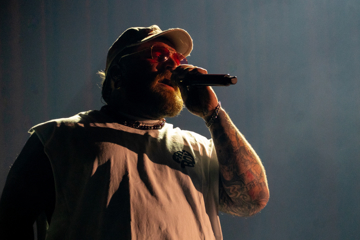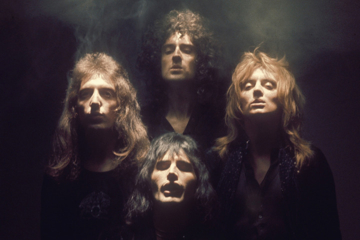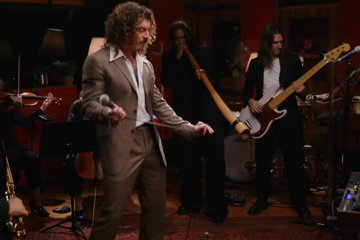Why Our Love Of War Bonnets Is Ruining Music Festivals
A Canadian festival has drawn the line while Aussies party on obliviously
Historically, music festivals have always been a place where people should feel free to express themselves and how they’re feeling, in whatever manner they please, within reason. If neon face-paint and animal onesies heighten your festival experience, then nobody can take that away from you, and you should rock the hell out of it.
This line of thinking, however, does not extend to Native American war bonnets (aka headdresses).
Once again, I’d like to point out that I am quite possibly the world’s whitest white man, but before we go further, you need to know that this isn’t a “white guilt” thing. In fact, we should be more concerned with a sense of white responsibility for making amends for all the fucked up things we’ve done to the world in the past in the name of our continued comfort and convenience.
A good start, as we've pointed out before, would be stopping our insistence on treating every other culture on the planet like our own private costume shop.
Don't miss a beat with our FREE daily newsletter


Within four hours of arriving at this weekend's Splendour In The Grass festival, I had seen more than 20 very non-Native American people wearing Native American war bonnets, either completely oblivious as to why that's an incredibly not-OK thing to do, or aware but unaffected by it, which is markedly worse.
The issue of other cultures' appropriative wearing of Native American war bonnets (Caucasians in particular) has recently experienced fresh attention in the wake of Canadian festival The Bass Coast Project banning the apparel from their event grounds for this year's festivities.
"For various reasons, Bass Coast Festival is banning feathered war bonnets, or anything resembling them, onsite. Our security team will be enforcing this policy," festival organisers wrote in a statement posted to Facebook recently.
"We understand why people are attracted to war bonnets. They have a magnificent aesthetic. But their spiritual, cultural and aesthetic significance cannot be separated.
"Bass Coast Festival takes place on indigenous land and we respect the dignity of aboriginal people. We have consulted with aboriginal people in British Columbia on this issue and we feel our policy aligns with their views and wishes regarding the subject. Their opinion is what matters to us."
Their opinion should be what matters to you, too. This isn't some Ricky Gervais pot-stirring bullshit where you can glibly say "Offence is never given, always taken!" and then plug your stupid TV show, refusing to ever make any kind of effort to not be such an incorrigible prat to other people in future. This isn't, as one erudite commenter on triple j host Zan Rowe's Instagram-based criticism of the practice claimed, "a costume". And the problem truly is one that is steeped in ignorance, and totally within our power to change.
As Bass Coast Festival pointed out, war bonnets are aesthetically magnificent creations. They are absolutely a sight to behold, but a white person wearing one is not the same as trying your hand at the didgeridoo (in an endorsed setting) or wearing a kimono at a Japanese bath house. War bonnets are spiritually and culturally significant items, largely used for ceremonial purposes now but traditionally bestowed for acts of bravery and honour in times of war.
You wouldn't go to Future, for example, dressed up (in a kitsch manner, no less) in traditional Indigenous Australian battle garb, and we have even less right to do it to native people in other countries who have also suffered unimaginable oppression at the hands of our distant pale-skinned relatives. Imagine how you'd feel if a neo-Nazi rocked up to a party wearing your grandfather's World War II medals, and you might be starting to formulate an idea of why this is such a problematic practice.
Before anyone claims overblown political correctness and people being offended for the sake of it (because there were a few of you in Zan's thread), you should know that this issue has been widely documented and spoken about by several Native American people and communities, and it is their feelings — not mine, and certainly not yours — that matter in this issue, regardless of how far away they might live.
If an entire group of people is saying, "hey, dudes, that's really not so cool, on account of the historically genocidal relationship our cultures have shared and your consequently flippant adoration of our highly restricted symbolic items of clothing and all," it's not our place to suddenly cry discrimination and that we're being left out of all the fun (which we love to do, let's be real — I saw one comment that intimated that any white person who didn't get upset when White Chicks was released had no right to be speaking out against war bonnets, an argument with which I don't even know where to begin).
As a side note, the very practice of continuing to treat other cultures as "exotic", in that Contiki Tour sense of the word, is dehumanising as hell, reducing fellow human beings to little more than fascinating exhibits in our own planet-sized zoo,and probably goes a long way towards explaining why our contented ambivalence towards other people's customs permeates so forcefully to this day.
Nobody's saying that we shouldn't be able to maintain a sense of open-mindedness as we move towards a greater state of global cultural integration, and make a better effort — all of us — to understand where the line falls between harmless homage and outright appropriation. Pop on a poncho; wear a beret; exercise your culturally acceptable, highly fashionable desires to your heart's content — just accept that, after the past few hundred years, if a culture asks us reasonably not to do something, it's only decent that we do our best to comply with their wishes.







